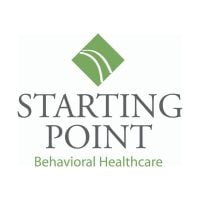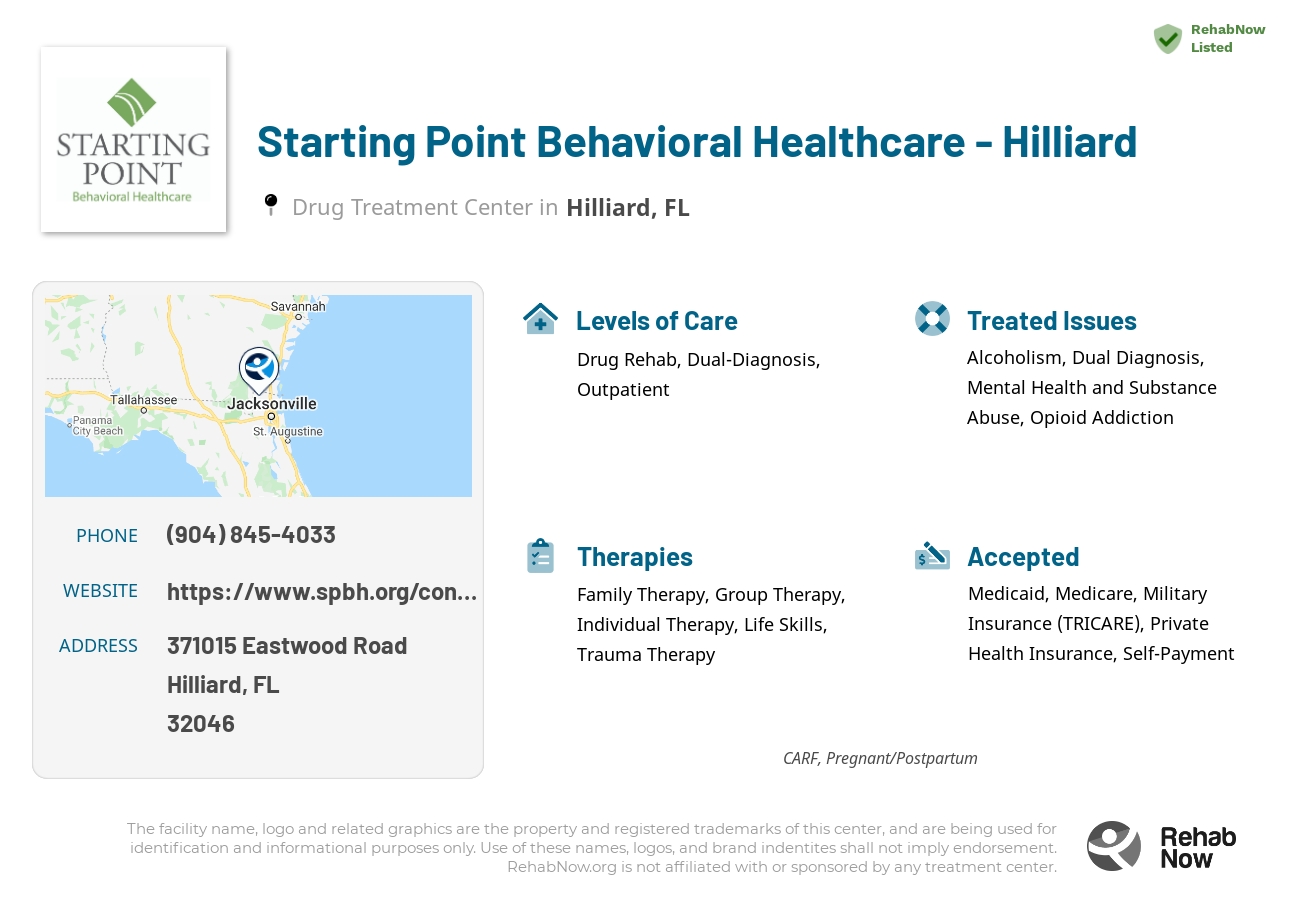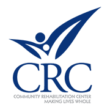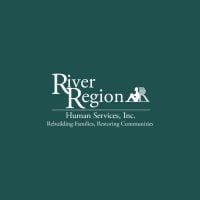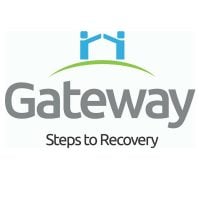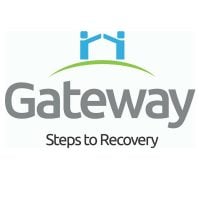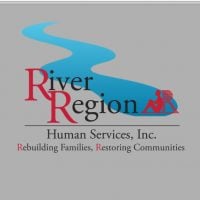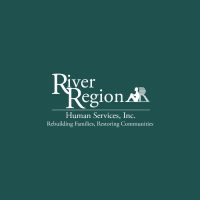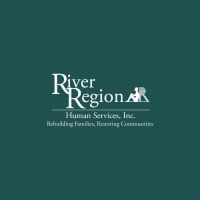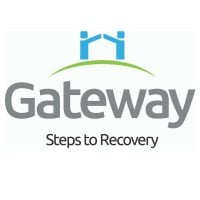Starting Point Behavioral Healthcare - Hilliard
Drug Rehab Center in Hilliard, Florida
Starting Point Behavioral Healthcare - Hilliard in Hilliard, Florida, is an accredited treatment facility offering personalized care and support for alcoholism, opioid addiction, dual diagnosis, mental health conditions, drug addiction, and substance abuse, with various levels of care including drug rehab, dual-diagnosis treatment, outpatient programs, and detox services, accepting private health insurance.
About This Florida Facility
Starting Point Behavioral Healthcare in Hilliard, Florida, is dedicated to assisting individuals of all ages overcome substance abuse and mental health challenges. This unique facility stands out for its holistic approach to treatment and special programs catering to women, children, and teens, focusing on empowering and healing.
- Special programs for women address issues like parenting and substance abuse, with services free for qualifying individuals.
- A dedicated track for teens emphasizes life skills, behavior modification, and habit control using Cognitive Behavioral Therapy.
- Psychiatric services include comprehensive support from evaluation to 24-hour emergency services and innovative treatments like art therapy.
Accredited by the Commission on Accreditation of Rehabilitation Facilities (CARF), Starting Point Behavioral Healthcare exemplifies a high standard of care. They offer a wide array of treatments tailored to the needs of individuals fighting addiction, mental health issues, or both.
The facility treats alcoholism, opioid addiction, drug addiction, and dual diagnosis, employing a variety of methods such as outpatient programs, detox services, and individualized rehab plans. Their holistic and inclusive approach ensures that every patient receives the support they need to start on the path to recovery.
Genders
Ages
Modality
Additional
Accreditations

CARF
The Commission on Accreditation of Rehabilitation Facilities (CARF) is a non-profit organization that specifically accredits rehab organizations. Founded in 1966, CARF's, mission is to help service providers like rehab facilities maintain high standards of care.
Conditions and Issues Treated
Opioid abuse has become a national epidemic in the last decade. The US has one of the world’s highest rates of opioid use and abuse, as well as opioid-related deaths. Opioids are classified as Schedule II-IV controlled substances in the US due to their high potential for abuse.
Oxycodone, hydrocodone, methadone, and fentanyl are the most common Opioids and are commonly prescribed to treat pain. Tolerance to opioids develops over time, making life difficult, if not impossible, without them. Opioid users often obtain the drugs illegally. They can be drug dealers, friends, or family members who do not have valid prescriptions.
The desire for a more intense high than prescription opioids can quickly lead to heroin use. Heroin users are more prone to illness and death due to the high risk of overdose.
Many opioid addicts who seek treatment believe that the only way to overcome their addiction is through medical detox and long-term drug addiction rehab. To help patients wean off their addiction and reduce the risk of overdose, medication-assisted therapy (MAT) involves prescribing a replacement opioid. Doctors use MAT in conjunction with other anti-craving medications to help patients maintain recovery. Due to the high risk of relapse, MAT is often combined with individual and group counseling and social support programs.
When addiction and psychiatric issues co-occur, the addict’s recovery is more successful when both conditions are treated. A dual diagnosis refers to a condition in which the patient is diagnosed with two health issues: addiction and bipolar disorder. The most common therapies are psychotherapy, behavioral therapy, spiritual counseling, 12-step programs, and medication management.
Levels of Care Offered at Starting Point Behavioral Healthcare - Hilliard
This center offers a variety of custom treatment tailored to individual recovery. Currently available are Drug Rehab, Dual-Diagnosis, Outpatient, with additional therapies available as listed below.
An outpatient treatment program is set up to help with alcohol or drug addiction or a co-occurring disorder. The patient must attend the facility for their therapy and other programs but can return home each night.
The frequency of mandatory attendance decreases after much of Starting Point Behavioral Healthcare - Hilliard‘s program is complete.
Outpatient treatment is a recovery approach that allows recovering addicts to live at home while getting rehab for addiction
An outpatient can include day treatments which include attending group sessions one hour per week. A person living in an outpatient environment may be allowed the opportunity to work full time if they choose to and continue studies without interruption from drugs/alcohol.
Outpatient treatment is an option for people who want to maintain their careers and families. Outpatients live at home but attend treatment such as individual counseling, group counseling, or twelve-step meetings during the day.
Therapies & Programs
At Starting Point Behavioral Healthcare - Hilliard , to learn from past mistakes and improve one’s situation, the recovering person meets individually with a therapist. The counselor or therapist will address addiction causes, triggers, mental issues, dual diagnosis, and aftercare plans during this time. This is a very intense and challenging process. Some clients find it easier to open up to someone other than family or friends who understand their struggles with addiction.
Family therapy is a crucial part of drug treatment and getting sober. It is one of the most effective ways to help addicts stay on the path to long-term sobriety. An addict’s family can play a vital part in helping them to avoid relapse. They can spot the warning signs and help them get back on track.
In group therapy, recovering addicts meet with a therapist and other people in recovery. Some groups are closed, meaning only people who share the same addiction or problem can attend. Others are open to anyone who wants to stop using drugs or drinking alcohol. Group therapy sessions typically focus on one topic each week or month so that recovering addicts can discuss issues they face daily.
Trauma therapy allows people to face and learn from past traumas.
Many people suffer childhood traumas that lead to adult addiction. During treatment at Starting Point Behavioral Healthcare - Hilliard [/type], you can move forward in your recovery and reclaim your sober future! Trauma is a common cause of psychological disorders like Addiction Disorder. It’s common in Addictive Disorders patients because traumatized people have strong emotions or thoughts that lead to addictive behaviors.
Cognitive Behavioral Therapy (CBT) is based on the idea that how we feel, think and act all interact together. It helps people explore their thoughts for problems (or false beliefs) that influence their mood and actions. CBT is very goal-oriented, which means that the therapist and patient work together on a specific problem. In addition to helping a client focus on thoughts that can be changed, CBT also allows them to take an active role in their treatment. Our thoughts determine our feelings and behaviors; our feelings affect our thoughts, and our behaviors change our thoughts and feelings.
Drug and alcohol addiction can lead to a breakdown in life skills. Learning certain life skills can help those who are struggling with addiction. Life skills training at Starting Point Behavioral Healthcare - Hilliard in Hilliard, FL teaches patients skills such as time management, budgeting, and social abilities to improve their quality of life and prevent relapse.
An addict’s life skills are maladaptive, meaning they are counterproductive. An addict may have learned poor time management skills growing up, have a hard time budgeting money, or be socially awkward. An addict’s poor life skills can lead to relapse and the inability to achieve long-term sobriety. Life skills training teaches patients effective coping mechanisms, which can help them live a clean and sober life.
Payment Options Accepted
For specific insurance or payment methods please contact us.
Is your insurance accepted?
Ask an expert, call (888) 674-0062
Starting Point Behavioral Healthcare Associated Centers
Discover treatment facilities under the same provider.
- Starting Point Behavioral Healthcare - Yulee in Yulee, FL
- Starting Point Behavioral Healthcare - Fernandina Beach in Fernandina Beach, FL
Learn More About Starting Point Behavioral Healthcare Centers
Additional Details
Specifics, location, and helpful extra information.
Hilliard, Florida 32046 Phone Number(904) 845-4033 Meta DetailsUpdated April 15, 2024
Staff Verified
Patient Reviews
There are no reviews yet. Be the first one to write one.
Hilliard, Florida Addiction Information
Florida is one of the nation's epicenters for substance abuse and drug-related overdoses. In 2014, around 410,000 Florida residents were addicted to drugs and alcohol. Over the last 10 years, 12% of all deaths in the state were attributed to substance abuse. Treatment admissions for alcohol reached 24,329 patients in 2016, and 2.5% of Florida high school students admitted to using crack cocaine.
Treatment in Nearby Cities
- Longwood, FL (141.6 mi.)
- Cape Coral, FL (285.5 mi.)
- Belle Glade, FL (287.1 mi.)
- Palmetto Bay, FL (363.6 mi.)
- Middleburg, FL (43.1 mi.)
Centers near Starting Point Behavioral Healthcare - Hilliard
The facility name, logo and brand are the property and registered trademarks of Starting Point Behavioral Healthcare - Hilliard, and are being used for identification and informational purposes only. Use of these names, logos and brands shall not imply endorsement. RehabNow.org is not affiliated with or sponsored by Starting Point Behavioral Healthcare - Hilliard.
